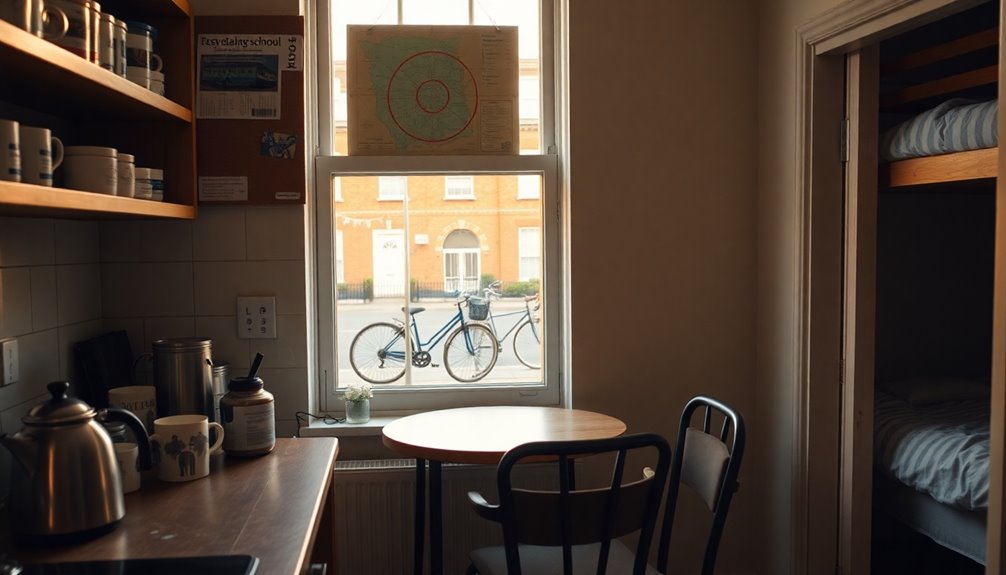
You’ll get high-quality English teaching in Ireland without breaking the bank, with short intensive or part-time courses that fit work or travel plans. Public colleges offer lower fees and formal credentials, while private schools give flexible schedules and small classes for faster speaking practice. Save on housing with homestays or shared flats, use bikes and local buses, and find part-time work to offset costs. Keep going to uncover specific savings, scholarships, and budgeting tips.
Affordable Course Options and Program Lengths
When you’re planning language study in Ireland on a budget, focus first on course type and duration: intensive short courses (2–4 weeks) give fast progress without long-term costs, part-time evening classes let you combine study with work, and community or college-run programs often charge lower fees than private schools. You’ll want options that maximize flexibility: choose modular courses so you can extend only if you enjoy it, or rolling admissions to avoid fixed semesters. For real practice, prioritize language immersion experiences and homestay programs that double as cultural exchange, letting you learn while living freely. Short focused bursts, combined with community-led meetups and volunteer placements, reduce costs and let you shape study around travel, work, or spontaneous plans.
Tuition Cost Breakdown for Language Schools
Now that you’ve weighed course types and lengths, it’s time to look at what you’ll actually pay. Start by checking published tuition fees per week or per term — shorter, intensive courses often cost more per hour but get you fluent faster, freeing time for travel or work. Ask if course materials are included or sold separately; books, online platforms, and exam fees can add up. Look for discounts for longer stays, early registration, or group bookings to stretch your budget and freedom. Also factor in registration and administrative fees; they vary by school. Finally, request a clear invoice before you commit so you can compare net costs and keep control of your spending without surprises.
Comparing Public Versus Private Language Providers
Although both public institutions and private schools teach the same language skills, they differ in cost, structure, and experience — public providers (universities, community colleges, language centres) tend to offer lower tuition and more standardized credentials, while private schools often provide flexible scheduling, smaller classes, and targeted exam or conversation courses. You’ll choose based on freedom: if you want predictable fees and formal recognition, public language options fit; if you want agility, tailored hours, and intensive speaking practice, private language suits. Consider class size, accreditation, and support services. Use this quick comparison to guide your choice:
| Provider Type | Typical Cost | Strength |
|---|---|---|
| Public language | Low-Medium | Accredited credentials |
| Private language | Medium-High | Flexible, small classes |
Housing Choices to Reduce Living Expenses

If you want to keep living costs down in Ireland, choosing the right housing will make the biggest difference: shared flats, homestays, and student residences each cut rent in different ways, so pick the option that matches your budget, comfort level, and daily routine. You’ll want flexible choices that let you explore freely while saving. Consider shared accommodations to split bills, homestays for immersive support, or student residences for fixed costs and social life. Look at local housing rules and neighbourhood vibes before signing.
Choosing the right housing—shared flats, homestays, or student residences—cuts rent and shapes your Irish experience.
- Shared accommodations: lower rent, split utilities, instant roommates.
- Homestays: meals included, cultural exchange, quieter environment.
- Student residences: predictable costs, on-campus convenience.
- Private rentals: more freedom, higher cost.
- Short-term lets: trial stays, flexible exits.
Transport and Commuting Cost-Saving Strategies
Many students find transport costs add up fast, but with a few smart choices you can keep commuting affordable without losing convenience. Look into public transport options—student passes, weekly caps, and off-peak travel cut costs and free up time for study or exploration. Mix modes: walk to nearby classes, hop on a bus or tram for longer trips, and use app-based ticketing to avoid fines. Consider second-hand bikes and embrace cycling benefits: it’s cheap, fast in traffic, and gives you independence to roam. Join bike-share schemes or local cycling groups for safety tips and maintenance help. Car-sharing and occasional taxis work for late nights, but prioritise low-cost, flexible options to protect your budget and freedom.
Meal Planning and Low-Cost Food Options
You can save a lot by doing smart weekly meal prep that keeps portions controlled and leftovers useful. Shop at affordable grocery chains and local markets to stretch your budget without sacrificing quality. Also check out campus or student-friendly eateries and meal deals for cheap, reliable dining options.
Smart Weekly Meal Prep
When you’re juggling classes, language practice, and a tight budget, smart weekly meal prep keeps your time and money from vanishing by midweek. You’ll feel freer if you plan meals that travel well, freeze easily, and use overlapping ingredients. Use simple meal prep strategies and budget friendly recipes to stretch groceries, reduce waste, and eat better while studying.
- Cook large batches of grains and proteins for quick mix-and-match lunches.
- Portion meals into reusable containers for grab-and-go days.
- Pick recipes that reuse sauces and vegetables across several dishes.
- Make a flexible shopping list that lets you swap ingredients by price.
- Reserve one “free” night to explore affordable local cafés or try a new recipe.
This approach gives you spare time for classes and conversation.
Affordable Grocery Stores
Smart meal prep pays off faster if you know where to buy the ingredients without breaking the bank. You’ll find discount supermarkets, co-ops, and vibrant local markets across Ireland where fresh produce and staples cost less. Shop seasonal fruit and veg, buy store-brand basics, and grab reduced-price items late in the day to stretch your budget. Use simple budget recipes—one-pot stews, pasta dishes, and hearty salads—that reuse ingredients and freeze well, so you’re free to study or explore rather than cook every night. Compare unit prices, bring reusable bags, and learn weekly flyers to catch deals. With smart shopping and focused meal plans, you’ll keep costs down and gain the flexibility to enjoy language study and life in Ireland.
Cheap Student Dining Options
If you’re on a student budget, planning meals and knowing low-cost dining options will keep you fed without draining your funds. You’ll want affordable meal options that let you explore Ireland while keeping freedom to choose where and when you eat. Use budget dining tips: cook simple staples, share large portions with flatmates, and hunt student deals at cafés or markets. Prioritize flexibility—mix home-cooked meals with occasional cheap takeaways to stay social and spontaneous.
- Prep staples like pasta, eggs, beans, and seasonal veg
- Split supermarket meal deals with friends
- Use campus canteens for discounted lunches
- Visit local markets late afternoon for reduced-price produce
- Pickstreet food and small cafés offering student discounts
These choices keep costs down and options open.
Affordable Social and Cultural Activities for Students

Want to soak up Irish culture without draining your wallet? You can immerse yourself in cultural festivals and explore local traditions at parades, street performances, and community fairs that often cost little or nothing. Join pub sessions for live music, take free walking tours to learn history, or visit markets and galleries with low entry fees. Volunteer at events to get behind-the-scenes access while connecting with locals. Look for student nights at theatres and discounted museum hours to stretch your budget. Rent a bike or hike coastal trails for scenic, cost-free adventures that refill your sense of freedom. You’ll meet people, practice language skills, and shape your own Irish experience without being tied to expensive itineraries.
Discounts, Scholarships, and Funding Opportunities
You can stretch your budget considerably by applying for scholarships and grants specifically for language study or international students. Many schools and programs also offer low-cost payment options like instalments, early-bird discounts, or sliding-scale fees to ease upfront costs. Look into both institutional funding and external awards so you can combine support and pay less overall.
Scholarships and Grants
Many language schools, universities, and cultural organisations in Ireland offer discounts, scholarships, or small grants to help lower the cost of study abroad; you’ll find options for beginners, advanced students, and specific nationalities or fields of study. You can chase funding that matches your goals and keep your plans flexible. Look into scholarship types and prepare concise grant applications that show impact and clear learning objectives. Practical tips help you succeed:
- Check school websites and local cultural centres for short-term awards.
- Apply early; deadlines are strict and spots limited.
- Tailor personal statements to learning outcomes and community engagement.
- Ask alumni or advisors for feedback on your grant applications.
- Combine small grants with savings to preserve freedom in travel and study.
Low-Cost Payment Options
Scholarships and small grants are just part of the funding picture; you’ll also find a range of low-cost payment options that make language study in Ireland more affordable. You can pick flexible payment plans that spread costs across months so you don’t drain your savings or tie yourself down. Many schools offer early-bird discounts, referral credits, and seasonal promotions that reduce tuition instantly. If you’re eligible, financial aid from local organizations or government schemes can cover course fees or living expenses, letting you pursue study without compromising independence. Combine reduced tuition, staggered payments, and targeted aid to craft an expense strategy that matches your budget and travel goals. That way you keep control, stay mobile, and learn on your terms.
Part-Time Work Rules and Earning Potential
If you plan to work while studying in Ireland, you’ll need to know the rules that apply to your visa and course level — they determine how many hours you can work, when, and whether you can take up internship or placement roles. You’ll find part time job opportunities in cafes, retail, and campus roles that respect study commitments and offer flexible work hours, letting you earn while exploring freely. Know limits: term-time caps differ from holidays, and internships may need formal approval. Aim for roles that boost language skills and CVs without squeezing your study-life balance.
- Check visa hour limits for your specific course
- Seek employer-friendly shifts and remote options
- Prioritize language-building roles
- Verify internship placement permissions
- Track earnings to stay compliant
Budgeting Tools and Monthly Cost Estimates
You’ll want a clear monthly cost breakdown—rent, utilities, transport, food, and course fees—to know what you actually need each month. Use simple budgeting tools like a spreadsheet, a budgeting app, and a separate savings account for emergencies. I’ll show quick examples and templates to help you track and adjust your budget.
Monthly Cost Breakdown
Breaking your monthly expenses into clear categories makes budgeting realistic and stress-free: expected items include rent and utilities, groceries and eating out, transport, mobile/data and internet, study materials and course fees, leisure, and a small emergency buffer. You’ll map costs to how freely you want to live—balancing savings with spirited weekends. Include modest allocations for language exchange meetups and cultural immersion outings to accelerate learning without breaking the bank. Track fixed versus variable costs, then tweak to fit your freedom-first lifestyle.
- Rent and utilities: prioritize location for access to resources
- Food: cook often, enjoy local cafés occasionally
- Transport: monthly pass or bike options
- Study: course fees, books, photocopies
- Leisure & buffer: social life and surprises
Essential Budgeting Tools
When you want control over your monthly spending in Ireland, a few simple tools will make tracking and adjusting your budget much easier: a spreadsheet or budgeting app to log income and expenses, a calendar for bill due dates, and a separate savings account or virtual “pots” for rent, bills, and emergency funds. You’ll keep freedom by choosing lightweight systems that match your routine. Use budgeting apps for automated categorization and quick views of where your money goes; pair them with simple expense tracking habits—scan receipts, enter cash spends nightly, and review weekly. Estimate monthly costs for rent, food, transport, study fees, and leisure, then allocate into pots. Review monthly, tweak limits, and you’ll stay flexible without sacrificing control.
Money-Saving Tips for Health Care and Insurance
Although health care in Ireland can feel pricey at first, a few smart choices will help you avoid surprise bills and keep costs down. You’ll want to explore health coverage options early so you can plan without stress and maintain the freedom to travel or study as you wish. Use insurance comparison tips to spot necessary coverages and avoid extras you don’t need.
- Check student-specific plans that include GP visits and emergency care
- Compare international vs. local insurers for cost and network access
- Use public clinics and prescription schemes where eligible
- Bundle travel and health cover for short-term savings
- Keep documentation handy to speed claims and reduce fees
Be proactive, ask questions, and pick flexible, transparent policies.
Seasonal Timing to Maximize Savings on Study Costs

Managing health coverage ahead of time saves you money and stress, and the same timing mindset applies to other study expenses. If you want freedom and flexibility, plan your trip around seasonal discounts — schools, hostels, and tours often cut prices in shoulder months. You’ll avoid crowds, stretch your budget, and pick up better housing deals or course bundles when demand dips. Look for short-term promotions, early-bird rates for summer programs, and off peak savings on flights and ferries. Book refundable options so you can pivot if something better appears. Monitor newsletters and comparison sites, set alerts, and be ready to act quickly. With timing on your side, you’ll study in Ireland without tying up extra funds.
Some Questions Answered
Can I Open a Local Bank Account as an International Language Student?
Yes — you can. You’ll meet bank account requirements like passport, proof of address and student ID; international student eligibility is usually accepted by most banks, so you’ll get freedom to manage funds while studying and exploring.
Are There Student Discounts for Cultural Festivals and Museums?
Yes — you’ll often get cultural discounts and easier festival access with a student card; you’ll save on museum entries, gigs and events, so you can freely explore arts, meet locals, and enjoy more without overspending.
How Safe Are Short-Term Shared Accommodations for Solo Travelers?
They’re generally safe if you’re careful; use safety tips like locking doors, vetting roommates, checking reviews, meeting hosts, and keeping valuables hidden. Shared accommodations suit free-spirited solo travelers who want social connection and flexibility.
Can I Bring Family Members or Dependents on a Language Study Visa?
Yes — you can sometimes bring family under family visa options, but you’ll need to meet dependent requirements like proof of funds, accommodation, and relationship documents; check specific visa rules so you can travel freely together without surprises.
Do Language Schools Offer Emergency Financial Assistance Programs?
Yes — many schools offer emergency financial assistance, and you’ll find tuition scholarships or short-term financial aid options; you can request support to stay independent and keep pursuing study without losing your freedom.
